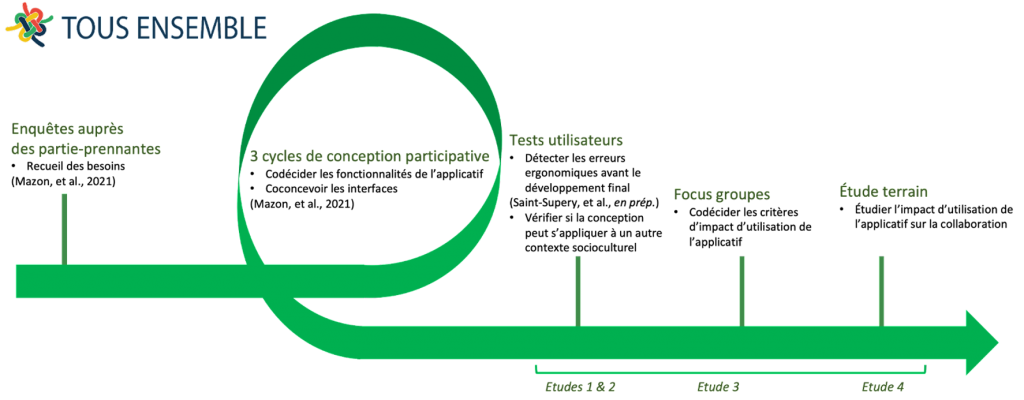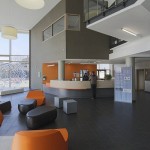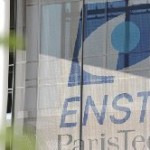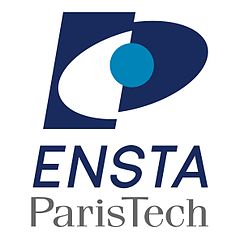Flowers Laboratory
FLOWing Epigenetic Robots and Systems
Projet Tous Ensemble / ToGather project

Pour nous contacter : tous_ensemble@inria.fr
Résumé du projet
Depuis plusieurs années, le centre Inria de l’Université de Bordeaux œuvre à des recherches-actions visant à coconcevoir et valider des outils numériques favorables à l’inclusion scolaire en classe ordinaire des élèves avec handicap cognitif et troubles socio-adaptatifs, et ce en partenariat étroit avec le Service Départemental de l’École Inclusive (SDEI) de l’académie de Bordeaux, le Centre Ressources Autisme de Bordeaux, l’association ARI et les familles. Parmi ces actions, le projet TousEnsemble est une recherche-action qui s’est donnée pour objectif de concevoir et évaluer un outil numérique pour favoriser la communication et la collaboration entre les familles et les professionnels impliqués dans le suivi et l’accompagnement d’un élève avec un trouble neurodéveloppemental (TND), et notamment un trouble du spectre de l’autisme (TSA).
Ce projet est né à la suite d’une large enquête menée auprès des parties prenantes de l’inclusion scolaire des élèves avec TND. Des enseignants (spécialisées ou non), des parents et des cliniciens (médicaux et paramédicaux) ont remonté des difficultés de communication et de partage des informations concernant l’élève, nuisibles à la bonne coordination de l’accompagnement offert par chacune d’entre elles. La communication et la collaboration entre familles, enseignants et professionnels médico-sociaux est pourtant essentielle pour l’accompagnement des enfants et adolescents avec TND, et notamment dans la mise en œuvre du Projet Personnalisé de Scolarisation (PPS). Mais parvenir à une collaboration efficace est souvent difficile, et le manque d’un espace partagé pour la communication et la coordination peut contribuer à ce problème.
À l’aide de méthodes participatives, un outil numérique a été co-conçu avec des parents, des enseignants et des professionnels médico-sociaux afin de leur fournir des services interactifs avec contenus ré-actualisables en continu, concernant : les forces et les faiblesses de l’élève, un suivi dans le temps du répertoire de compétences acquises, un carnet partagé de solutions psychoéducatives, une messagerie partagée et un gestionnaire de réunion. Après avoir réalisé une évaluation ergonomique de l’interface proposée, l’outil a été développé et testé en conditions réelles auprès d’une centaine de participants. Cette étude-terrain vise à évaluer les impacts de l’utilisation de cet outil sur les relations parent-professionnels et interprofessionnelles, sur leur communication et leurs pratiques de collaboration.

Overview of ToGather Project
For several years, the Inria Center of the University of Bordeaux has been engaged in research-action initiatives aimed at co-designing and validating digital tools that promote the school inclusion of children and youths with cognitive disabilities and socio-adaptive disorders in mainstream classrooms. This is done in close partnership with the Departmental Service for Inclusive Education (SDEI) of the Bordeaux Academy, the Autism Resource Center of Bordeaux, the ARI association, and families. Among these actions, the ToGather project is a research-action that aims to design and evaluate a digital tool to facilitate communication and collaboration between families and professionals directly involved in the guidance and support of students with neurodevelopmental disorders (NDD), with a particular emphasis on autism spectrum disorders (ASD).
This project originated from a comprehensive survey conducted with stakeholders in the inclusive education of students with NDD. Teachers (specialized or not), parents, and clinicians (medical and paramedical) reported difficulties in communication and information sharing regarding the student, which were detrimental to the effective coordination of support provided by each of them. Communication and collaboration between families, teachers, and medical-social professionals are yet essential for the support of children and adolescents with NDD, particularly in the implementation of the Individualized Education Plan (IEP). However, achieving effective collaboration is often challenging, and the lack of a shared space for communication and coordination can contribute to this problem.
Using participatory methods, a digital tool was co-designed with parents, teachers, and medical-social professionals to provide them with interactive services with continuously updated content, including the student’s strengths and weaknesses, a longitudinal tracking of acquired skills, a shared notebook of psychoeducational solutions, shared messaging, and a meeting manager. After conducting an ergonomic evaluation of the proposed interface, the tool was developed and tested under real conditions with about a hundred participants. This field study aims to assess the impacts of using this tool on parent-professional and interprofessional relationships, their communication, and their collaboration practices.
Partenaires / Project partner
Scientifiques :
– Flowers team (Inria centre de l’Université de Bordeaux)
– Active team (Bordeaux Population Health, Inserm-Université de Bordeaux)
– Unité de Logopédie Clinique, RUCHE, Université de Liège (Belgique)
Institutionnels et associatifs :
– Service Départemental de l’École Inclusive (Académie de Bordeaux)
– Centre Ressources Autisme Aquitaine
– Association ARI
Financements / Funding
– Firah (Fondation Internationale de Recherche Appliquée sur le Handicap) en partenariat avec le CCAH (Comité national Coordination Action Handicap) et KLESIA – Appel à projets Actifs Aidants 2019
– Région Nouvelle Aquitaine
Valorisations scientifiques
Articles publiés, en soumission ou en préparation
Mazon, C., Etchegoyhen, K., Saint Supery, I., Amestoy, A., Bouvard, M., Consel, C., & Sauzéon, H. (2021). Fostering parents‑professional collaboration for facilitating the school inclusion of students with ASD: Design of the “ToGather” web‑based prototype. Educational technology research and development, 1‑32. Disponible en accès libre sur : https://inria.hal.science/hal-03436355/
Saint Supery, I., Mazon, C., Meyer, E., & Sauzéon, H. (2023). Conception d’une application de soutien à la coéducation pour l’inclusion scolaire des élèves TSA. Éthiques inclusives en éducation. Recherches, contextes et pratiques (p. 145-160), Champs Social. Disponible en accès libre sur : https://inria.hal.science/hal-04147610
Meyer, E., Sauzéon, H., Saint-Supery, I., Mazon, C. (in prep.). Collaborative digital technologies for stakeholders in the educational inclusion of students with ASD or special education needs: a systematic review.
Saint Supery, I., Sauzéon, H., Meyer, E., & Mazon, C. (submitted). ToGather, an interactive website for the stakeholders of school inclusion of children with ASD: an iterative design including user testing. Version « pre‑print » disponible en accès libre sur : https://inria.hal.science/hal-03898867/document
Communication orales ou affichées dans des congrès nationaux ou internationaux
Mazon, C. (2022, Mai). Technologies numériques pour la scolarisation des enfants avec TSA. Communication orale invitée présentée à la journée Brain Conference NeuroDev : Les Troubles du Neurodéveloppement, des mécanismes moléculaires à l’inclusion sociale. Bordeaux (France). Support en accès libre sur : https://inria.hal.science/hal-04147618
Saint Supery, I., Etchegoyhen, K., Amestoy, A., Bouvard, M., Consel, C., Sauzéon, H., & Mazon, C. (2022, Mai). Conception centrée‑utilisateur de l’application web TousEnsemble: un outil de soutien à la collaboration famille‑professionnels et interprofessionnelle pour la scolarisation des collégiens avec TSA. 1er Colloque international du GNCRA 2022. Disponible en accès libre sur : https://inria.hal.science/hal-03898613v1
Meyer, E., Saint Supery, I., Rahouadj, M., Simonpietri, C., Mazon, C., & Sauzéon, H. (2022, Mai). Évaluation de l’expérience utilisateur d’un site web interactif de soutien à la collaboration famille‑professionnels et interprofessionnelle pour la scolarisation des collégiens avec TSA. 1er Colloque international du GNCRA 2022. Disponible en accès libre sur : https://inria.hal.science/hal-03898667v1
Saint Supery, I., Mazon, C., Meyer, E., & Sauzéon, H. (2022, Octobre). Conception d’une application de soutien à la coéducation pour l’inclusion scolaire des élèves avec des Troubles du Spectre de l’Autisme (TSA). ISATT 2022‑L’éthique inclusive comme nouvel horizon éducatif pour les enseignants et pour l’enseignement. Support en accès libre sur : https://inria.hal.science/hal-03898554v1
Meyer, E., Sauzéon, H., Saint-Supery, I., Mazon, C. (2023, Août). Systematic review of technologies to collaborate and co-educate students with special educational needs and supporting their schooling. IHIET 2023 – 10th International Conference on Human Interaction and Emerging Technologies. Disponible en accès libre sur : https://inria.hal.science/hal-04222434
Saint Supery, I., Sauzéon, H., Maillart, C., Neu, N., Meyer, E., & Mazon, C. (2023, Août). Cross‑cultural evaluation of a web application to support communication and collaboration among stakeholders of the school inclusion of children with ASD. AAATE 2023 – The 17h International Conference of the Association for the Advancement of Assistive Technology in Europe. Résumé en accès libre sur : https://inria.hal.science/hal-04147612
Valorisations à destination du grand public
Ressources multimédias
- Chaine YouTube du projet : https://www.youtube.com/@tousensemble2184
- Présentation du projet : https://www.youtube.com/watch?v=OH-0c472v1k&t=11s
- Présentation de l’application web TousEnsemble : https://www.youtube.com/watch?v=fQ7M8NTlUEc
- Tutoriels d’utilisation :
- À destination des parents : https://www.youtube.com/watch?v=RqL7P24ZnM8
- À destination des professionnels : https://www.youtube.com/watch?v=nCQ8YA8fTJE
- À destination des référents : https://www.youtube.com/watch?v=IFQgbirjV8Q
- Retours après expérimentation :
- Raison d’être du projet : https://youtu.be/P9FfGlTWXfg
- Retours sur l’utilisation : https://youtu.be/w_1XucQqypo
- Complémentarité avec le Livret Parcours Inclusif :https://youtu.be/BsFW6zre5yA
- Instagram : https://www.instagram.com/tousensembleprojet/
Documents écrits
- Meyer, E., Saint-Supery, I., Sauzéon, H., & Mazon, C. (2022) L’inclusion scolaire des élèves avec TSA : Prospection et analyse documentaire pour co-concevoir et valider des outils numériques favorables à l’inclusion scolaire en milieu ordinaire des élèves. Dossier documentaire no39 de la Firah. Disponible sur https://www.firah.org/fr/revue-de-litterature.html
Interventions grand-public, stands
- Ateliers d’immersion sur les pratiques de conception participative par Cécile Mazon et Isabeau Saint-Super, auprès d’enseignants Ulis et de professionnels médico-sociaux et d’éducation, lors de la Journée d’inauguration de la chaire « Handicap, éducation et numérique » (Suresnes du 21 au 23 octobre 2021)
Webinaires
- Deux wébinaires à destination du grand public par Cécile Mazon et Hélène Sauzéon lors du Lil’Lab (Living and Learning Lab for Neurodévelopment) en octobre 2021 (Replay)
- Webinaire par Hélène Sauzéon sur les systèmes numériques d’éducation et l’accessibilité, lors de la journée « Autour de l’autisme : vers une université inclusive », organisée dans le cadre du projet national AspieFriendly.
- Mazon, C. (2022, nov.). Participation à la table ronde organisée par l’association FLUPA (Luxembroug) sur la contribution de l’UX au parcours de soin des patients. (Replay)
- Mazon, C. (2022, janv.). Les technologies au service de la scolarisation des enfants avec TSA : Approche systémique de l’accompagnement. Webinaire organisé par l’INSPE de Nancy et l’Université de Lorraine sur les apports des technologies numériques au développement et aux apprentissages des enfants avec TSA. (Replay)



